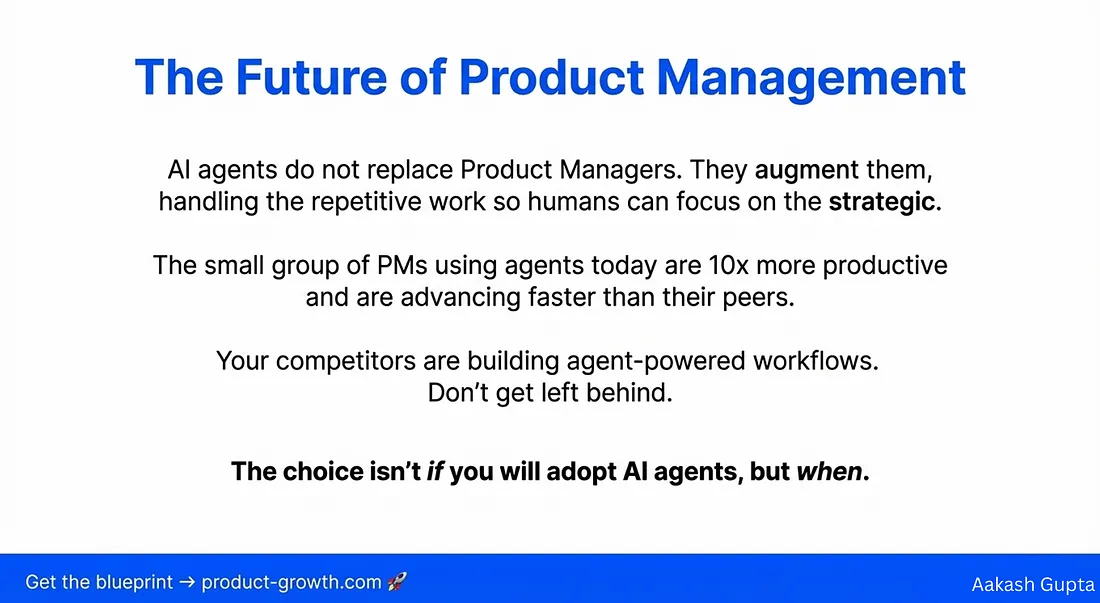
Future of Product Management: 2024 Forecast
Introduction
Product management has come a long way in the last decade, but there have been many setbacks.
There are more jobs, interest, and awareness in product management than ever before.
But the product world has also become an increasingly chaotic domain.
There are many human and commercial motivations at play, influencing the state of the product management domain.
This review outlines some of the market dynamics in product management in 2024.
Product Management Forecast
Product Management Jobs — Substantially more job openings in product management will be available in high-tech and traditional industries.
The yearly increase in product management jobs is estimated at 30%-40%.
The average annual salary for a product manager in the US is now over US$100,000.
Salary ranges can vary widely depending on many important factors, including education, certifications, additional skills, the number of products, their complexities, and the technology involved.
As of January 2024, there are over 1 million profiles on LinkedIn with the Product Manager title, compared to 700,000 profiles in early 2023.
There are about ten software development jobs for every product management job, but as demand for software applications grows, so does the correlated demand for product managers.
Hiring for product management positions at software and technology startups is booming.
Many see product management as a lifelong career and a stepping stone to an executive management position.
Investment and interest in product management will grow as more companies wish to transition from a technology-driven product delivery strategy to a market-driven one.
Qualified Talent Shortage — Human resources (HR) managers and professional recruiters indicate exponential growth in applicants for product management jobs but a noticeable decrease in qualified candidates.
A combination of factors contributed to making it more challenging to find skilled product managers at all levels and in many industries, not just software.
To handle the massive volume of job applicants, HR managers and recruiters increasingly rely on computerized systems to sort and rank candidates for consideration and interviewing.
Since 2020, three years in a row, there has been no letup in the ongoing talent recession in product management.
2024 will be no different.
Thought Leadership — Sorely lacking for a very long time, thought leadership in product management is surprisingly reemerging.
Leading the resurgence are a handful of veterans and newcomers who share unique perspectives, insights, predictions, and strategies on product management.
Thought leadership appeals primarily to product leaders in the product management community, as practitioners are naturally more focused on completing tasks.
Expect to see new conventions and thought-provoking propositions emerging in 2024.
Product Philosophers — The trend of product philosophers, which emerged in 2023, will continue into 2024.
Equipped with prolific writing skills and an uncanny knack for complexifying the simplest of topics, product philosophers ponder the meaning of roadmaps, product feature prioritization, team management, product leadership, product delivery, product strategy, and more.
Product philosophers focus on particular topics and often quote themselves.
Their work is marked by carefully crafted, insightful semi-dissertations accompanied by intricate, professionally made graphics.
Some product philosophers have the brightest ideas that resonate with their many followers.
More product philosophers will emerge in 2024, promoting lively debates.
Product Leadership — Demand has outstripped supply for senior professionals (CPOs, VPs) who know how to formulate and lead product organizations and establish effective product management processes.
The ongoing talent shortage of experienced and knowledgeable product leaders has caused the VP of Product Management and Chief Product Officer (CPO) salaries to skyrocket.
The average annual salary in the US for a VP of Product Management or Chief Product Officer (CPO) is now about US$300,000.
In some cases, a product leader’s salary is even higher depending on domain knowledge, education, geographical location, and years of experience.
Filling a senior product leadership position can sometimes take a year.
The supply and demand gap for competent professional product leaders will widen in 2024.
Jack of All Trades — Product managers nowadays are burdened with more tasks than ever before.
Layoffs, staff reductions, budgetary constraints, tight delivery schedules, and lack of skilled peers contribute to an ever-increasing workload.
The responsibilities range from strategic to tactical, from technical to operational (project management).
This is the Generalization approach to product management (product manager does everything, aka CEO of the Product), which was typical during the 1980s-1990s, particularly in Silicon Valley.
The Generalization approach is now being relabeled as a Single Product Manager or Individual Product Management Contributor. Other similar style names will likely follow.
Product managers who find themselves doing program management, project management, product planning, Scrum product ownership, and product marketing and sales support are likely engaged in the Generalization approach.
The Generalization approach can save money and centralize decisions, but the downside is that it’s endless, without boundaries, no specialization, and cannot scale.
The lack of scaling draws in the engineers to provide timely resolutions to outstanding issues, eventually marginalizing the product manager.
The Generalization approach can succeed with resilient multi-disciplinary product managers, which are hard to come by.
The Generalization approach to product management might be making a comeback in 2024, but it’s too early to tell.
Jobs Before Skills — It used to be that product management candidates first developed skills through training, apprenticeship, interning, participation, volunteering, networking, self-study, certification, and even observation, and then sought a job.
Now, it is the opposite, with many people first seeking a product management job, and only after they have a job do they begin building the required knowledge and skills.
Consequently, a growing number of workshops, courses, consulting, ChatGPTs, and websites offer guidance on how to break into product management, how to land a job in product management, how to study for a product management interview, how to pass the product management interview, how to manage a career in product management, etc.
Several vendors informally allude that their services can help secure a job interview or even employment at highly sought-after companies such as Amazon, Apple, Facebook, Google, Microsoft, Tesla, etc. This marketing tactic is questionable.
Some of those who land a product management position quickly find that the skills required to pass an interview aren’t the skills necessary to do the job. After a short stint, they are let go.
There is no substitute for knowledge and experience.
Artificial Intelligence (AI) Tools — Using AI, specifically writing AI prompts, will become a skill practiced by product managers to automate complex or repetitive tasks, search the internet, query and analyze data to gain insights, uncover trends, and optimize decision-making.
Eventually, there will be a dedicated AI Manager to configure, manage, and employ AI on behalf of product managers when AI tools start demanding a lengthy learning curve.
AI will likely replace jobs and tasks that deal with simple processing of language and numbers, including social media content creation, simple data processing, data and form entry, and graphic design.
AI will not replace product management roles.
There will be no AI Product Manager.
The safest jobs from emerging AI applications require strategic thinking and many deliberations with other humans, like executive management and product management.
Software Development Methods — Scrum is on the decline, and Waterfall has been vilified so much that it is not even being considered.
The void has been filled by the Scaled Agile Framework (SAFe), an expansive and complex variation of Waterfall that is cleverly marketed as being Agile.
SAFe does not provide a coherent view of product management.
However, SAFe’s view of product management is less disruptive than far-fetched interpretations of the Scrum Product Owner role that encroach on product management.
The growing adoption of SAFe in software companies at the expense of pure Scrum continues to provide relief to product managers to focus on product management.
Product Operations (ProductOps) — Blackblot’s view is that Product Operations (ProductOps) is a collective term that describes best practices, practical tools, and efficient processes to streamline the communication and collaboration between product management teams and their internal counterparts (sales, marketing, UX, and product development) in the organization.
In PMTK, the Director of Products is responsible for ProductOps.
There was a noticeable marketing effort during 2023 to advance ProductOps and advocate for a specialized and dedicated role, supposedly titled Product Operations Manager, to handle product operations.
However, there are conflicting interpretations and inconsistencies on what ProductOps is and what it entails.
It will take time, beyond 2024, until ProductOps reaches a broad consensus, shared understanding, and subject matter consolidation.
Product Management Certification — Product management certification options on the market remain relatively stable, with some certification vendors exiting the market.
New low-stakes certification options, essentially easy-to-pass quizzes, will be introduced as Micro Certifications. Expect to see these tests being heavily promoted.
Overall demand for product management certification in North America will decrease or plateau in 2024 due to being incorrectly lumped in with Agile/Scrum certifications.
Agile/Scrum certifications are being derided as ineffectual and even a scam.
Medium-stakes product management certification options (e.g., Blackblot BPMP) will remain highly respected and desired in Europe, India and Asia.
Blackblot BPMP-certified product managers report an average five percent (5%) salary increase after getting certified and higher yearly performance review scores by their managers.
Certain multinational companies continue to mandate all their product managers be certified as part of the company’s HR department’s professional competencies development policy.
Other multinational companies actively seek certified product manager candidates for their open positions. This will remain stable.
During 2024, there will be no change in the limited demand for certified product managers by startups and small and medium businesses.
Large Tech. Company Crossover — In early 2020, Microsoft, Google, Project Management Institute (PMI), and similar organizations provided free courses in user experience (UX) design, project management, Agile, and similar topics.
Blackblot’s prediction that these large American technology companies, with their vast human resources and large marketing budgets, will go further and provide free product management courses and certifications, most likely based on public-domain content, did not materialize.
In 2024, large technology companies will remain focused on technology and product development and will not venture to provide content, training, and certification in the business and leadership domain, which includes product management.
Large Consulting Crossover — Large consulting and research firms (e.g., Gartner, Forrester) ceased to actively market their own branded product management consulting service due to low demand.
Developed circa 2020, these expensive and superficial consulting services were based on widely available public-domain content (lean, MVP, agile, design thinking, etc.), which anybody could obtain freely.
It is unlikely that large consulting and research firms will attempt to restart their product management consulting services during 2024.
Publications — Self-published booklets and eBooks are now the trend.
Relatively easy to produce, in 2024, there will be more product management digital booklets published containing blog post aggregations, collections of interviews with practitioners, lists of tips & tricks, career suggestions, lists of resources, and public-domain content trending on social media.
The majority of the booklets and eBooks are free of charge and geared at promoting the author and services rendered.
These booklets and eBooks are an excellent resource for all product managers, especially beginners.
Layoffs — Multiple and massive layoff rounds marked the year 2023, including at large, financially stable American technology companies.
Many product managers were affected.
However, staff reductions occur due to technological, social, economic, political, and geographical factors, and all this is unrelated to product management or the demand for product managers.
Layoffs are the norm, especially in modern technology companies.
In June 2023, Brian Chesky, Airbnb’s CEO, said, “We got rid of the classic product management function”.
In November 2023, Snap announced it laid off twenty employees, all holding product management titles.
These two well-publicized events indicate nothing substantive, but the reaction on social media exposed many product managers’ job insecurities.
With this reality in mind, product managers, now more than ever, must relentlessly invest in their work skills and network with like-minded professionals.
Product Coaching — More companies acknowledge the importance of internal mentoring and will build internal product management coaching and mentoring programs for their employees.
Over 90% of Fortune 500 companies in the US have mentoring programs of some form.
The new role of a Product Coach will become more visible and a mainstay.
In 2024, it will be evident that the product coaching domain has split into two groups: Organizational Product Coaches and Product Management Coaches.
Organizational Product Coaches rely on industrial and organizational psychology (I/O psychology) and focus on individual and team empowerment, team dynamics, culture, mindset, motivation, attitudes, human factors, behaviors, individual performance, and personal development.
Generic I/O psychology concepts are applied here in the context of product management and product development.
Product Management Coaches rely on product management theory and best practices and focus on improving team and individual product manager performance.
In this scenario, implementation guides for product management roles, tasks, teams, processes, and leadership are applied by Product Management Coaches to improve job performance.
Product Management Training —Single-day, single-topic workshops, mainly about product strategy, product-market fit, minimum viable product (MVP), product-let growth (PLG), product planning (rebranded as product discovery), road mapping, and metrics were heavily promoted in 2023.
More types of single-day, single-topic workshops will be offered in 2024.
During 2023, the high-end training market has gone through a correction with instructor-led, end-to-end foundational courses that teach a complete and cohesive product management curriculum now being offered only by a handful of professional top-tier vendors (including Blackblot).
Like product coaching, product leadership courses have split into two camps: MBA-style and Strategic.
The MBA-style product leadership courses deal with financials, budgeting, reporting, communicating with executives, workplace relationships, and organizational issues.
The Strategic product leadership courses focus on strategy formulation, methodology application (roles, tasks, teams, processes), team leadership, and winning products.
The remarkable growth in online, web-based product management training options, boosted after COVID-19 during 2020–2022, has ceased.
An oversaturated market, high production costs, and a confusing array of related and unrelated topics have substantially decreased the demand for online product management training.
Basic product management content available online for free on websites, YouTube and social media is replacing online and web-based product management training.
Identity and Essence — It’s a daily occurrence of people trying to explain to themselves and others what product management is and what a product manager does.
People continue to struggle with questions related to product management identity and role definitions that have already been answered in PMTK twenty years ago.
Product manager job descriptions are increasingly task-based instead of role-based, which further confuses people on what product management is.
Lack of clarity and cohesiveness remains the greatest obstacle to the advancement of product management.
Traditional Industries — Blackblot’s 2021 prediction that traditional industries, specifically non-software manufacturers and service providers, will build new product management groups and hire more product managers has come true in the US.
The financial sector, particularly banks and credit card companies, now has more product managers on their payroll.
Ongoing digital transformation of store retailers such as Walmart and Home Depot invariably led to larger product management groups.
These hiring trends will increase in 2024 with traditional companies investing and becoming more proficient in product management.
Manufacturers and service providers have a less technical and more commercial and operational view of product management that differs from the way product management is applied at technology companies.
Manufacturers and service providers will likely not adopt product management practices used by technology companies.
Politics and Social Justice — To boost sales and as a marketing tactic, some product management training and consulting vendors attempted to link product management to a wide range of political topics and social justice issues such as diversity, inclusion, gender, women, race, minorities, climate change, inequality, etc.
Similarly, major companies’ product marketing departments led the charge to rebrand the company’s image by associating themselves with social justice issues and diversity-equity-inclusion (DEI) initiatives.
In most cases, these marketing efforts were inconsequential, and in some cases, as with the Bud Light debacle, were detrimental to the brand.
2024 will see some decrease in this marketing tactic and a return to value-based or price-based marketing efforts.
Software Development — Software development practices continue to struggle to achieve subject matter consolidation.
The commercialization movement of selling Agile training, consulting, coaching, certification, and transformation services is active but strongly critiqued.
The Agile wars (LeSS, DAD, SAFe, Scrum, Kanban, XP) have sparked endless internal debates, over-analysis, and over-interpretations.
It seems that the winner is Scaled Agile Framework (SAFe) by the rate of adoption, but pure Scrum still has many vocal and loyal proponents.
Scrum and SAFe’s encroachment upon product management, trying to shape and control product management to their needs, is decreasing due to these methods’ inability to justify and logically explain their encroachment.
The Product Manager versus Product Owner debate is no longer of interest because of Scrum’s decline, and more companies have realized that the product manager is not subservient to any product development method currently employed by the engineers.
Turmoil in product development will continue to spill over from product development into product management, but 2024 will see much less of it.
Social Media — Social media is replacing online advertising, e.g., Google Ads, as the choice media to promote product management brands and services.
Activity on traditional social media channels, Reddit, Quora, LinkedIn, Twitter, and even TikTok, has dramatically increased in 2023 and will continue to do so into 2024.
The volume of product management-related online social media postings and discussions will continue to grow exponentially.
However, quality on social media is being replaced by quantity.
Social media channels will be increasingly flooded by irrelevant, commercial, and advertising posts.
The volume of easy-to-produce vague statements and this-versus-that comparisons will grow.
Product management practitioners will continue to be distracted by the renaming and relabeling of pre-existing terms and content that only offer the appearance of new and promising ideas.
A variety of applicable but non-essential and non-related content for product managers is published, just about anything from financial reporting to basic coding and wireframing. This will go on.
The increased volume of content on social media is positive because it brings more interest and visibility to product management.
However, now, one has to sift through mountains of simplistic, pseudo-philosophical, and commercial content to find something practical or useful.
Finding straight answers and clarity on social media is possible but will prove to be a mounting challenge in 2024.
Product Management Methodologies — PMTK remains the only product management methodology presently available.
Simple unsupported product management models partial to Agile software development, which were introduced into the market by new entrants in early 2020, have faded away.
Unfounded product management variations such as digital product management, technical product management, and software product management have also faded away.
Instead, there are lots of new product manager titles such as Growth Product Manager, Artificial Intelligence (AI) Product Manager, Data-driven Product Manager, Technical Product Manager, Customer-centric Product Manager, Generalist Product Manager, Business-focused Product Manager, etc., which mostly indicate a domain specialization, not a form of product management.
Overall, product management is evolving, but in some cases, it is being distorted by logically invalid ideas.
It will take time to untangle all this and bring back more clarity to product management.
Summary
There is no better time to be a product manager, but man-made challenges and obstacles await.
Circumventing them is possible if one is keenly aware.










Comments ...
No Comments Yet ...Add One